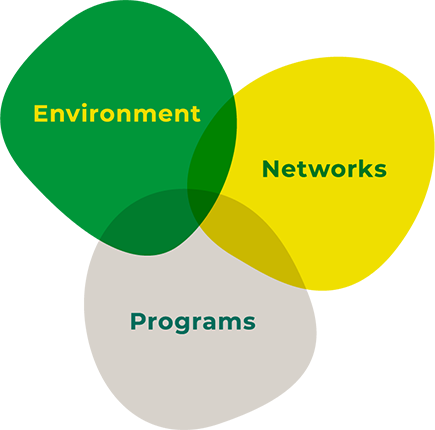About the Project
What is Creative Well-being Tokyo?

It is a project that endeavors to improve accessibility to arts and culture so that everyone can encounter cultural facilities and art programs and participate easily at all ages from infants to seniors, with and without disabilities, and people with roots overseas too. Going to see an exhibition at an art museum, enjoying a play at a theatre, creating something at a workshop... We work to make environments accessible so that everyone can have these experiences, resulting in "well-being" through arts and culture in Tokyo.
Accessibility it is not just about physical access to cultural facilities. We think about it in broad terms including psychological ways to make facilities more friendly so that people of different economic, social, and cultural backgrounds can have equal access.
We partner with cultural facilities and NPOs that tackle community issues, using their diverse viewpoints and experiences, working together to promote vital initiatives for arts and culture activities.
Organized by the Tokyo Metropolitan Government and Arts Council Tokyo (Tokyo Metropolitan Foundation for History and Culture)
Creative Well-being Tokyo's Major Initiatives
- Creating an Accessible Environment
- We create accessible environments mainly at Tokyo's municipal cultural facilities and cultural programs so that everyone can encounter, experience, and participate in arts and culture regardless of their abilities, age, and other factors.
- Developing Programs
- We work at developing programs that are needed by people in a variety of standpoints by confronting social issues and collaborating with cultural facilities, NPOs, research institutes and more around Japan and further afield.
- Building Networks
- We build networks between cultural facilities and leaders developing accessibility initiatives, sharing, providing information and promoting improved accessibility.

Information Accessibility Support Initiatives
- Wheelchair
- Spaces for appreciating arts and culture that accommodate wheelchairs, and exhibition rooms that are accessible via slopes that can be used with wheelchairs.
- Device-based Auditory Information Support
- Implements audio induction loops, hearing assistance systems, and other devices and systems that help to more effectively communicate sound.
- Sign Language
- Guided tours, talks, symposiums, and other programming with sign language interpretation support.
Languages: Japanese Sign Language, International Sign, other
- Subtitles
- Films, plays, facility guide videos, etc. include subtitles.
Languages: Japanese, English, other
- Device-based Visual Information Support
- Devices that provide visual information support have been implemented.
- Tactile Graphics / Tactile Maps / Braille
- This support includes artwork and models that may be touched, tactile maps that show the layout of the venue, and braille venue guidance and explanatory notes for artworks.
- Audio Guides
- During plays, performances, and video works, audio guides describe scenes, movement and expressions on performers, and more, to provide visual information support in an audible format.
- Support for text-to-speech functionality
- Implementation of QR codes on explanatory notes for works of arts and leaflets to allow apps and devices to read the text aloud.
- Stage Orientation
- A description is provided of the stage design, costumes of performers, size of the space and more for plays and other stage performances.
This is usually held before the show begins.
- Easy Japanese
- Information boards and artwork explanations in Easy Japanese are provided.
What is Easy Japanese? It is Japanese that uses simple expressions so it is easier for people who speak Japanese as a foreign language to understand.
- Appreciation Support
- There are programs that support people in a range of ways in order to offer more ways for more people to enjoy arts and culture, including appreciation events with guided tours, exhibition events that allow baby carriages, and large text leaflets to support for people with low vision.
About Arts Council Tokyo
(Tokyo Metropolitan Foundation for History and Culture)
Arts Council Tokyo develops a variety of programs to encourage the creation and dissemination of arts and culture and to promote Tokyo as an international city of artistic and cultural attractions.
In order to improve the infrastructure and environment for new artistic and cultural creation, Arts Council Tokyo plays a key role in Tokyo's cultural policies by implementing programs that explore Tokyo's originality and diversity, promoting international cultural exchange, and providing opportunities for promising young people who engage in a variety of artistic and cultural pursuits.
Inquiries for the Site
Arts Council Tokyo
Tokyo Metropolitan Foundation for History and Culture
Social Inclusion
Project Coordination Division, Project Department
Kudan First Place 5F, 4-1-28, Kudankita, Chiyoda-ku, Tokyo 102-0073
TEL +81-(0)3-6256-8435 (10:00–18:00 excluding weekends and national holidays)
E-mail:info-cwt@artscouncil-tokyo.jp
excluding weekends and national holidays)
*Please note we may be unable to reply depending on the nature of your inquiry. Also, please note that it may take some time for us to reply depending on the nature of your question. The personal information of customers we receive inquiries from will not be used for any purpose other than for responding to inquiries. Please see the following page regarding the group’s handling of personal information (Privacy Policy).












